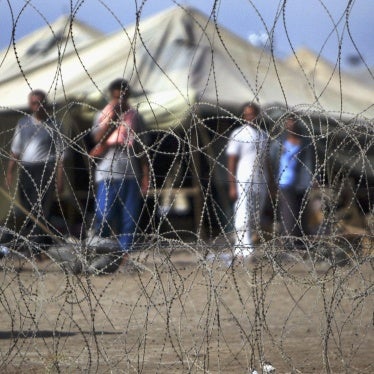Military intelligence personnel encouraged guards to soften up detainees for interrogation by using various coercive methods, such as exhausting detainees to the point of collapse or subjecting them to extremes of heat and cold. Soldiers also severely beat detainees as a cruel form of "stress relief." In one case, a soldier broke a prisoner's leg with a metal baseball bat.
It is disturbing in no small measure because of the 82nd's storied past, from D-Day to Operation Desert Storm. But in the end, this sad chapter is more about a failure of leadership in the Bush administration than about the members of this justly proud fighting unit.
Torture and other abuse at Forward Operating Base Mercury occurred almost daily from mid-2003 through 2004.
Military intelligence personnel encouraged guards to soften up detainees for interrogation by using various coercive methods, such as exhausting detainees to the point of collapse or subjecting them to extremes of heat and cold. Soldiers also severely beat detainees as a cruel form of "stress relief." In one case, a soldier broke a prisoner's leg with a metal baseball bat.
Such treatment clearly violates the Geneva Conventions and the U.S. military's code of military justice. And many of those detained proved not to be insurgents after all: As one sergeant told Human Rights Watch, "If he was a good guy, you know, now he's a bad guy because of the way we treated him."
So why didn't officers step in and put a halt to these crimes? One problem is that ever since Afghanistan, U.S. officers in the field have been uncertain about which rules applied to the treatment of prisoners. This is shocking. At least since Columbia professor Francis Lieber drafted a legal code for the Union Army in 1863, U.S. military doctrine has recognized the importance of treating one's captured adversaries without cruelty, without exception.
But in February 2002, President Bush announced that those taken prisoner in Afghanistan and elsewhere in the "war on terror" were not entitled to the protections of the Geneva Conventions. Prisoners would be treated "humanely" as a matter of policy, not law. Senior military officers objected to this radical break from the past, but were ignored. Since the Abu Ghraib prison scandal broke, we have learned about the infamous Justice Department "torture memos" and the "migration" of coercive interrogation methods from Afghanistan and Guantanamo Bay, Cuba, to Iraq.
Now we know how the administration's policies affected matters. The old rules were thrown out, even though the Pentagon insisted the Geneva Conventions applied in Iraq. And no one seems to have provided soldiers with training in the otherwise vague notion of "humane treatment." So confusion was the order of the day.
For example, when an officer of the 82nd, Capt. Ian Fishback, sought higher-ups for advice, they brushed him off. When he complained about practices that conflicted with his West Point training, he says he was told to be mindful of his career and keep his mouth shut. The Army has now agreed to investigate his allegations, but thus far, this investigation appears aimed only at intimidating the whistleblowers rather than uncovering the wrongdoers.
The Bush administration has created a mess whose reach stretches beyond the 82nd. The Pentagon will undoubtedly point to past blue-ribbon investigations and the many cases against low-ranking soldiers. However, the investigations and the prosecutions to date seem more intended to obscure the role of high-level military and civilian officials than to shed light on and punish those most responsible.
As Republican Sen. John McCain of Arizona, a member of the Armed Services Committee who met last week with Captain Fishback, concluded about the torture and abuse on a recent ABC This Week Sunday show, "We've got to have it stopped. It is hurting America's image abroad."
What is needed is a 9/11-style commission to fully investigate prisoner abuse. A special prosecutor should be appointed to investigate possible civilian criminality. And amendments to the 2006 defense budget bill proposed by Mr. McCain and fellow Republican Sens. Lindsey Graham of South Carolina and John W. Warner of Virginia that clarify minimum standards of treatment should be adopted.
The Senate approved such a measure 90-9 on October 5, but it faces stiff opposition from the White House and House Republicans.
Finally, one hopes that those soldiers who bravely stepped forward will be recognized among the 82nd Airborne's long list of heroes.








